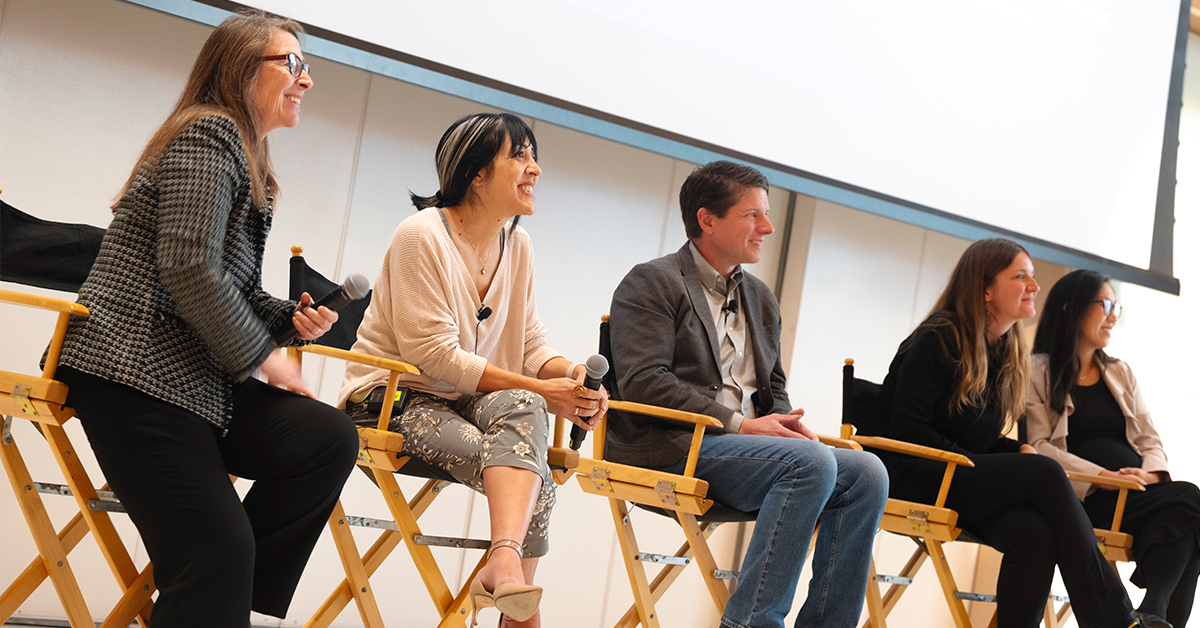Curiosity Ignited: Showcasing How AI is Accelerating Discoveries
The inaugural Curiosity Ignited academic symposium explored topics of AI and its connection to interdisciplinary research at UC San Diego
Story by:
Published Date
Article Content
The inaugural Curiosity Ignited, a signature Homecoming academic symposium, explored topics of AI and its connection to interdisciplinary research at UC San Diego. Students, alumni, and thought leaders gathered on Saturday, November 9, for engaging presentations and discussions on how UC San Diego is advancing the world’s use of AI while creating an equitable future.
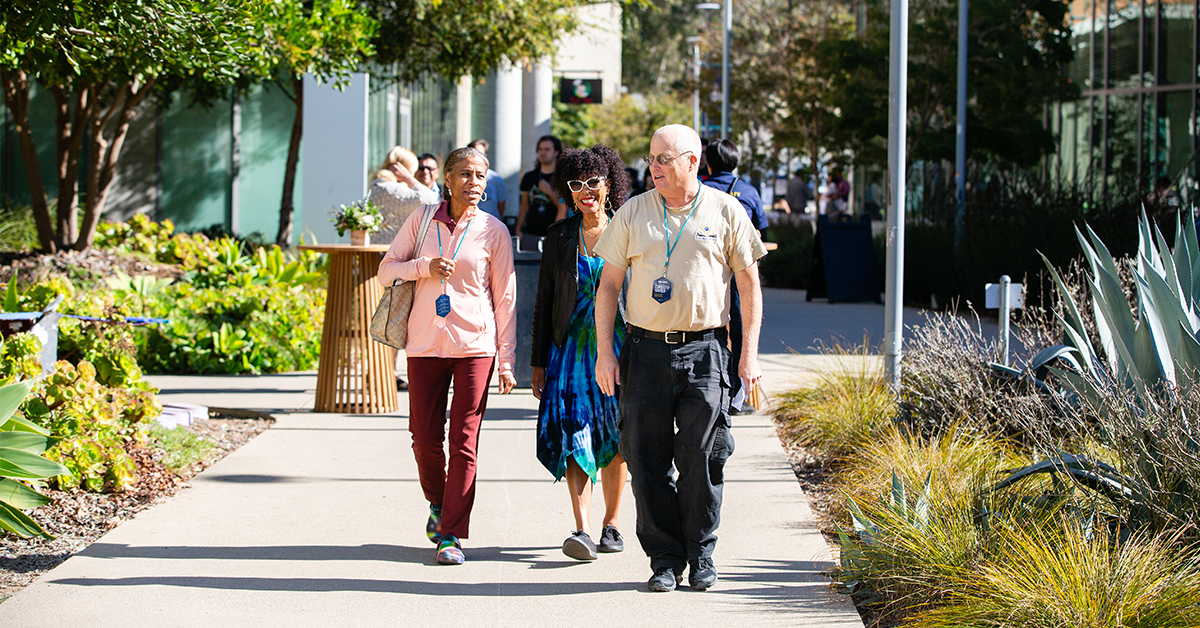
Providing opportunities to hear from UC San Diego’s faculty researchers was a new part of UC San Diego Alumni’s Homecoming 2024, a nod to the university’s distinguished reputation as a top-tier campus for changemaking discoveries.
Vice Chancellor for Research and Innovation Corinne Peek-Asa kicked off the event by emphasizing the importance of foundational research and intellectual curiosity, driving home the theme of the event – research that sparks change. In her remarks, Peek-Asa also emphasized the importance of mentorship.
“In addition to their remarkable research and work, our presenters are also amazing mentors,” Peek-Asa said. “Mentoring our students who will be future leaders of discovery and innovation is central to our mission and is essential for advancing equity in our increasingly interconnected world.”
The four presenters represented a variety of fields and initiatives at UC San Diego whose work engages AI in very distinct ways:
“Mentoring our students who will be future leaders of discovery and innovation is central to our mission and is essential for advancing equity in our increasingly interconnected world.”
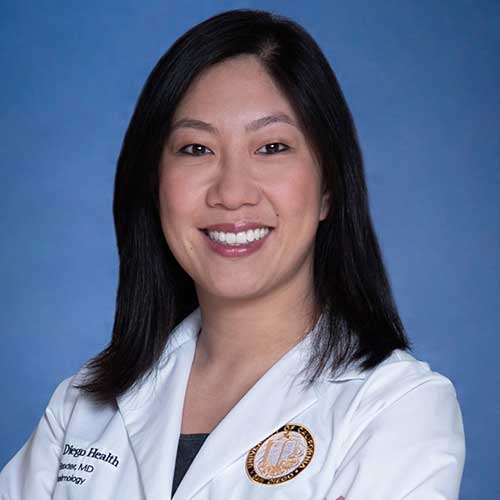
Sally Baxter
Sally Baxter, a researcher and practicing clinician, spoke about AI’s role in transforming healthcare. She explained that for many people, losing their vision is their greatest fear, but early detection and treatment can preserve vision and avoid blindness.
Diabetic retinopathy is currently the leading cause of visual impairment in working-age adults in the United States. However, there are gaps in implementing screenings, particularly for underserved populations who may not have access to clinical eye care. AI is bridging that gap by expanding diabetic retinopathy screenings to primary care. She discussed IDx-DR, the first autonomous AI algorithm to be approved by the FDA in any field of medicine, which streamlines diabetic retinopathy screening and its results. UC San Diego has developed an expanded diabetic retinopathy screening network across multiple primary care and endocrinology clinics since 2020, screening over 3,000 patients to date.
UC San Diego is also a global leader in developing AI models for glaucoma, the leading cause of irreversible blindness globally. The work is advancing glaucoma AI models from research environments to point-of-care for real-world use with the use of systemic data. Baxter expressed that researchers are also excited about the unique opportunity to use AI to further understand health and disease in other parts of the body by identifying biomarkers in the eyes that clinicians cannot detect on their own.
She emphasized that medicine has been “digitized” for a long time, but leveraging how data is used can improve both patient care and outcomes. She envisions that future research will use AI to bridge the gaps of healthcare access shortages and inequities.
Future research will use AI to bridge the gaps of healthcare access shortages and inequities.
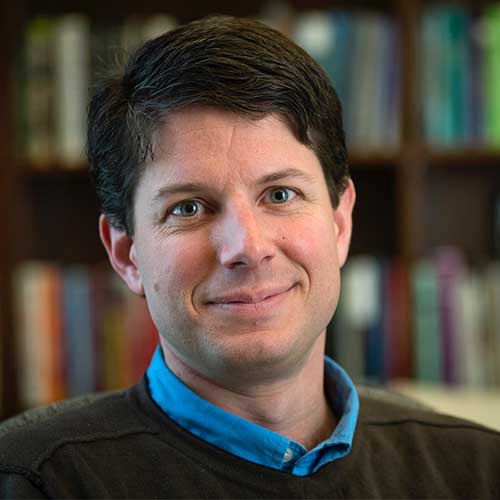
David Danks
David Danks, whose research explores the ethical implications of AI, presented “Responsible & Trustworthy AI?” He began by discussing autonomous vehicles, which have increased in use in recent years, but have also made headlines for fatal pedestrian accidents. Using this example, he illustrated the complexities of introducing and regulating innovative technologies.
On the one hand, Danks argued, these vehicles are better than humans at long-distance freeway driving where the conditions are more predictable and humans are prone to exhaustion and distraction. However, they have shown that they are not accident-free and can pose dangers.
New technologies and data usage are being introduced in all aspects of life, but Danks asked the audience to consider if there are practices and policies that look at the ethical and social implications of such technology, and when those aren’t present, should they be?
“Developing novel algorithms that not just avoid bias but also address the cause of biases may be one answer,” Danks said. He also discussed the concept of dynamic certification, a regulatory framework created specifically for AI systems. This framework aims to bridge the gap between rapid AI advancement and effective regulatory oversight. As AI continues to grow and evolve, people and policies will also need to adapt. Ethical standards for AI can ensure that these technologies are used to improve inequities rather than causing harm.
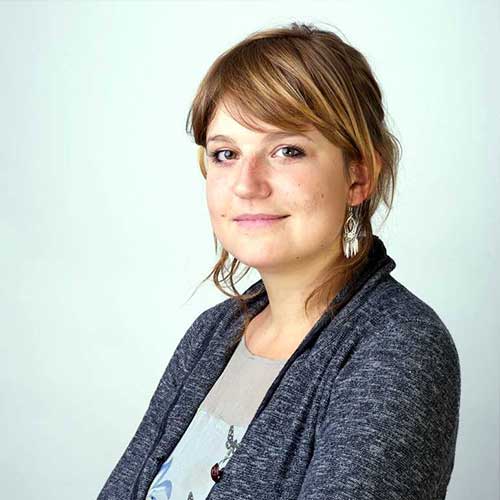
Alice Gabriel
Alice Gabriel, presented “Cracking the Earthquake Code.” Much of the world’s population is at risk of experiencing the impacts of earthquakes, which can be both devastating and fatal. Although we cannot predict earthquakes yet, Gabriel discussed how research is getting closer to unraveling their mystery with the use of AI and supercomputing.
Her work has looked at two major earthquakes, the 2019 Ridgecrest, California earthquake sequence and the 2023 Kahramanmaras, Türkiye earthquake sequence.
Gabriel, who is an associate professor at the Institute of Geophysics and Planetary Physics (IGPP) at the Scripps Institution of Oceanography, shared that supercomputing is improving earthquake models and enabling researchers to find links between the world’s biggest earthquakes, but she added that with these advancements, “researchers have the opportunity and responsibility to improve our current understanding of earthquake interactions and dynamics.”
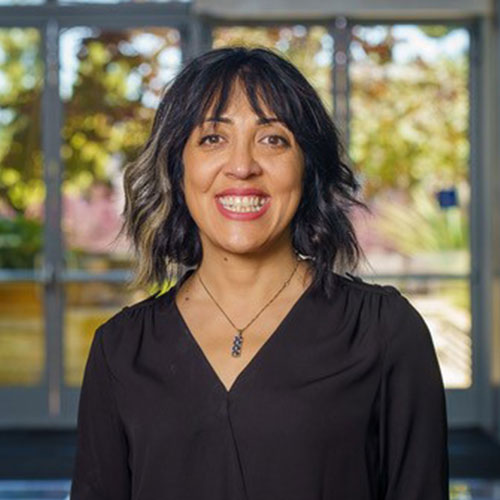
Tara Javidi
Tara Javidi is the co-principal investigator at The Institute for Learning-enabled Optimization at Scale (TILOS), a founding co-director of the Center for Machine-Integrated Computing and Security, and faculty director of the Eric and Wendy Schmidt AI in Science Postdoctoral Fellowship at UC San Diego.
She explained that much of her work looks at how scientific discovery can be done faster and at scale, “adding finesse to historic technology in a responsible way.”
Javidi talked about how optimization at scale is a universal challenge in science. “Real-world optimization always runs into challenges of scale and complexity,” she said.
She posited that historically, environmental monitoring systems have been slow, unreliable, and costly, leading to repeated catastrophic environmental incidents such as large oil spills and gas leaks, but added that there is an opportunity for future engineering solutions to improve environmental monitoring, to “protect our planet one site and one incident at a time.”
Scientific discovery can be done faster and at scale, “adding finesse to historic technology in a responsible way.”
Following the four “TED-style” talks, the faculty presenters joined Peek-Asa for a question and answer session with the audience. Among the audience questions were:
What are some of the most exciting discoveries we are about to make?
The panelists all agreed that there are many exciting scientific opportunities on the horizon with AI including faster responses and a deeper understanding of how to build systems more responsibly. One of the themes of the day was that we are still learning what AI will enable us to do and how it will continue to transform research.
How are you working with your teams to address disparities in research for underrepresented populations?
The panelists, all representing different disciplinary backgrounds, echoed the importance of training and mentoring, and including diversity of perspective early in the research pipeline. Additionally, the rise of codevelopment in research was discussed. Looking at the source data behind AI models, people are increasingly playing not just the role of information sources, but also joint researchers especially when they are the ones most impacted. Interdisciplinary research at UC San Diego will also continue to extend beyond the university with a continued legacy of partnership with other universities and community partners around the world.
Learn more about research and education at UC San Diego in: Artificial Intelligence
Share This:
You May Also Like
Stay in the Know
Keep up with all the latest from UC San Diego. Subscribe to the newsletter today.
